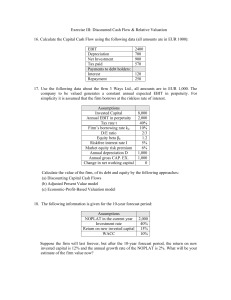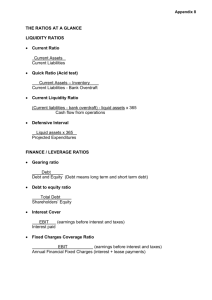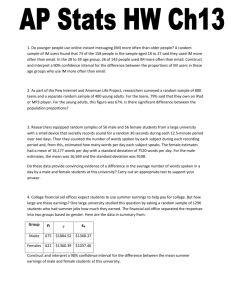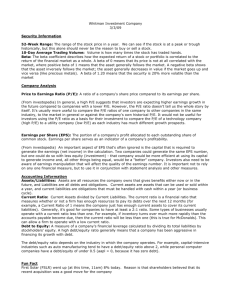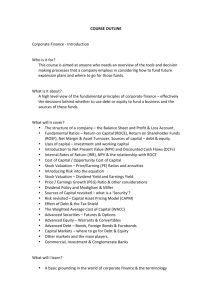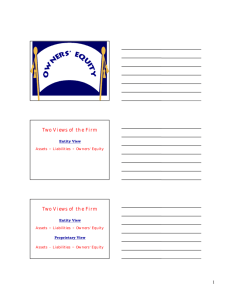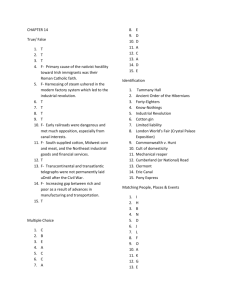CONTENTS
advertisement
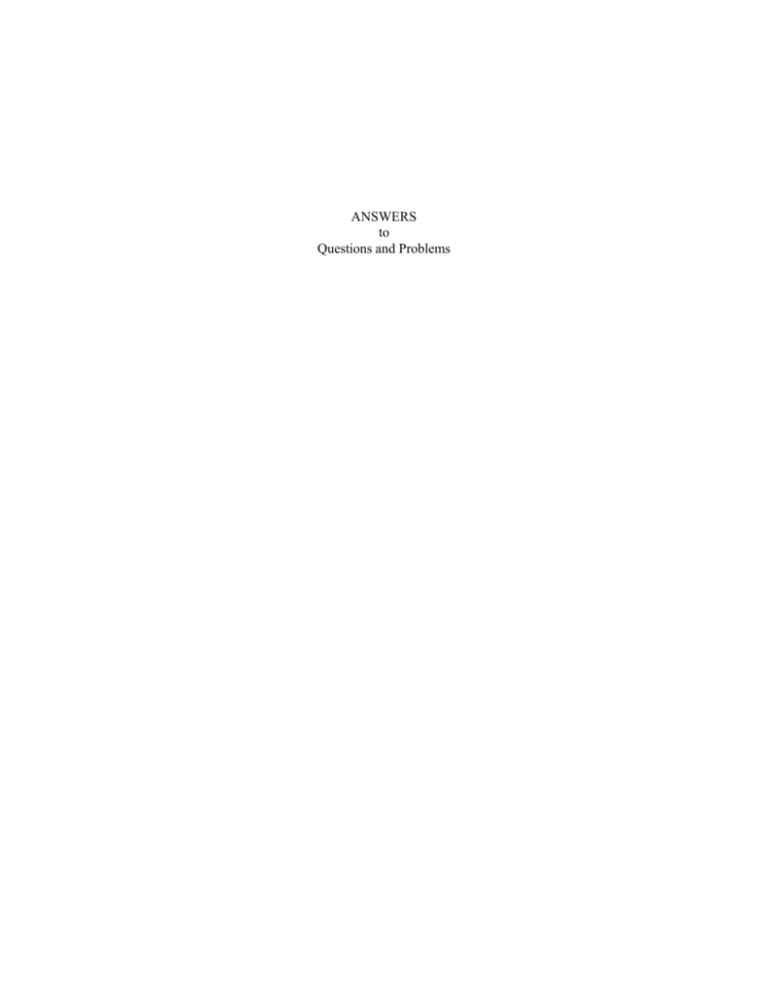
ANSWERS to Questions and Problems Chapter 1 True and False 1. 2. 3. 4. 5. False. The policies are the strategies used to achieve the goals. True. This was in Babylon, or earlier. False. Financial specialists began with the Industrial Revolution and were further developed by the Great Depression. False. Shareholder wealth maximization is the approach to use. False. The term for charging excess interest is “usury”. Matching 1. 2. 3. 4. b d a c Multiple Choice 1. 2. B D 3. C Usury was considered to be the charging of any interest during the middle ages. Presently it refers to charging interest at an exorbitant rate. Interest for the loans was 5%, and paper certificates were not issued. Chapter 2 True and False 1. 2. 3. 4. 5. True True True False (auction method) False (secondary) Matching 1. 2. 3. 4. 5. 6. 7. 8. A G H C D E F B Problems 1. Year 1 2 3 50 150 50 150 50 150 200 200 200 4 5 50 0 50 0 50 50 6 50 0 50 50(P/A,8%,6) = 50(4.623) = $231.15 150(P/A,8%,3) = 150(2.577) = 386.55 Total = $617.70 2. (P/F,4%,5) = 0.8219 (P/F,6%,5) = 0.7473 1.5692 1.5692 = (P/F,5%5) = 0.7846 The table factor is 0.7835 3. A. PN = P0 (1 + i)N PN = 120 (1 + .055)3 = 140.90897 B. PN = P0 (1 + i m ) m.N = 120 (1 + .0275)6 = 141.21 4. (1 + j) = (1 + j = (1 + i m .07 4 )m )4 - 1 j = 1.0719 – 1 j = .0719 or 7.19% Multiple Choice 1. 2. 3. 4. 5. A B C C B Problems 1. Common unit of trade = $1000 .09 90.00 Chapter 3 True and False 1. 2. 3. 4. True True False False Problems 1. a. 500 x 3 = 1500 1500 – 150 = $270 5 b. (5 – 3 + 1) (1500 – 150) = 3(1350) = $270 ½ (5) (6) 15 c. j = ½ (N + 3) j = ½ (5 + 3) j = 4 years Chapter 5 True and False 1. 2. 3. 4. 5. 6. 7. False False True True False True False Chapter 6 Multiple Choice 1. 2. 3. C C B Problems 1. NPV = (3000 x the factor for a future annuity of 5 years at 10%) – 10,000 NPV = 3000 x 4.1002 – 10,000 NPV = 12,300.60 – 10,000 NPV = 2,300.60 Since NPV is positive this project should be accepted. 2. PI = 12,300.60 10,000 PI = 1.23 Since PI is greater than 1 this project should be accepted. 3. 1500 = 200 x factor for a future annuity of 10 years at an internal rate of return r. 7.5 = factor for 10 years at a rate of r. r = 5% factor = 7.7217 r = 6% factor = 7.3601 The internal rate of return is in between 5% and 6%. To find the internal rate of return, interpolate between 5% and 6%. 7.7217 – 7.3601 = .3616 7.7217 – 7.5000 = .2217 IRR = 5.00 + .2217/.3616 IRR = 5.00 + .61311 IRR = 5.61311 Since 5.61311 is less than the cost of capital of 10%, this project should be rejected. Chapter 7 True and False 1. False A balloon loan is characterized by a cash inflow in period one, followed by a few small equal payments in a few subsequent periods and finally one large payment on the entire balance due. 2. False It is one of four things needed to use internal rate of return. Specifically, it is used to determine what period to look at in the present value tables. It is also the n used in the equation used for internal rate of return. 3. False If one project is dependent upon the acceptance of another, these projects are contingent not mutually exclusive. Mutually exclusive projects are projects in which only one can be adopted. 4. False Depreciation is merely the writing down of an asset and involves no cash. Therefore, to determine the true cash flow of a business, the amount of depreciation expense must be added back to the net income after taxes. 5. True The difference in cash inflows and outflows are computed and treated as though it were a third project. An internal rate of return is then computed for that project and used in evaluating the two original projects. General Equations Internal Rate of Return 5 Original cost = n F 1 r n F is the cash flow n is the year Project A 18,436 = 5,500 3.352 = 5 n 1/ 1 r n 1 5 n 1/ 1 r n 1 Look up in the present value of an annuity in the five year row and find the interest rate corresponding to 3.352. It is 15%. Project B 5 n 19,911 = 5,800 ( 1/ 1 r ) n 1 5 n 3,433 = 1/ 1 r n 1 Look up in the present value of an annuity in the five year column and find the interest rate corresponding to 3.433. It is 14%. Project C 5 n 1,475 = 1/ 1 r n 1 5 n 4,9166 = 1/ 1 r n 1 Look up in the present value of an annuity table in the five year column and find the interest rate corresponding to 4.9166. It is between ½ and ⅔%. Project yields less than the firm’s 12% cost of capital. Since the projects are mutually exclusive we can only choose one; therefore, Project A is the best choice. Problem A B (difference) C $18,436 $19,911 $1,475 F1 5,500 5,800 300 F2 5,500 5,800 300 F3 5,500 5,800 300 F4 5,500 5,800 300 F5 5,500 5,800 300 15% 14% ½ to ⅔% Project Original Cost Cash Flow Internal Rate of Return Chapter 8 True and False 1. Simple investment involves at least one change of sign in cash flows. False. A simple investment involves an initial cash out-flow followed by a series of cash inflows. 2. Lower Internal Rate of Return is preferable to higher. False. Higher Internal Rate of Return is preferable to lower. 3. A non-simple investment may graphically have two internal rates of return. True. While this is true, a project contains only one internal rate of return. 4. The project with the maximum expect return may not necessarily be the best project. True. There are other variables that are not considered in this situation. Chapter 9 True and False 1. 2. 3. 4. 5. True False True False False Matching 1. 2. 3. 4. 5. C A B D E Multiple Choice 1. 2. 3. C D C Problem The present value of the project is calculated as follows: 5 5 5 1000 Rn 1000 PV = P0 n P0 n 1 1 i d n 1 1 .06 .04 5 n 1 1.10 5 5 = 1000 1 1.1 n 1 5 = 1000 (3.7908) = $3,790.80 Chapter 12 1. False A logical strategy without portfolio considerations would be to place all fund into one security. 2. True 3. False When a distribution is relatively more peaked, it is less risky. 4. False The coefficient of variations adjusts riskiness for the expected returns so that high expected returns will have less measures of risk. 5. False A risk taker is an investor who will take an uncertain return with a lower expected value than that provided by a certain outcome. 6. True 7. True 8. False 9. True 10. True Solution to Problem Cov xy 1 N X E x Yt E y N t 1 t Cov xy [(.12 - .11) (.15 - .14)] = (.01) (.01) = (.0001) = Cov xy Chapter 13 True and False 1. 2. 3. 4. 5. True False True True False Preferred stock has priority over common. Individual stockholders are not responsible for corporations’ debts; they are responsible for their personal liabilities only. Matching 1. 2. A D 3. D When stock is sold through any means, a record of the number of outstanding shares is maintained. Problem 5000 17 1 3000 = 1.33 therefore, one director could be elected. # of directors possible = (# shares owned – 1) (# directors to be elected + 1) # shares outstanding Chapter 14 Multiple Choice 1. 2. B C 3. 4. 5. D C B Semi-strong form test is a part of Efficient Markets Theory. Louis Bachelor found that a systematic relationship between price and season of purchase/sale did not exist. Statements A, B, and C are true regarding the Efficient Markets Theory. Fundamental Theory uses a quantitative rather than qualitative approach. Eugene Fama used tests to measure market efficiency. True and False 1. 2. True True Chapter 15 Matching 1. 2. 3. 4. 5. Adjustment Convertible Registered Serial Debenture True and False 6. 7. 8. 9. 10. True False False True False 11. False 12. 13. 14. 15. True True False True The existence of the secondary market allows the primary market to thrive. Without the existence of a secondary market, securities would not sell well in the primary market. The underwriter is responsible for selling those issues purchased. The originating investment banker normally services as manager. These are various means of advertising to the public. Multiple Choice 16. 17. D A 18. B Issues larger than $500,000 must be registered. Under best effort there is no commitment, an agency relationship, and the investment banker takes on no risk. Only the purchasing group is involved in buying. Problems 19. Moody’s Aaa Aa A Baa Ba B Caa Ca C Standard & Poor’s AAA AA A BBB BB B CCC CC C 20. Leverage allows for the magnification of earnings. A fixed quantity of earnings is divided among all debt holders. This enables the firm to reduce the number of common stock shareholders associated with a given quantity of earning. The cost is a fixed debt service charge (interest) incurred as a result of issuing a debt. Chapter 16 True and False 1. 2. 3. 4. 5. False False True False True Multiple Choice 1. 2. 3. C B E Problem Using the following information and data, calculate the weighted average cost of capital. Consider a corporate income tax rate of 50% in your answer. Sources Bond Issue Preferred Stock Common Stock Market Value Effective Cost 100,000 500,000 1,000,000 5% (1 - .5) 10% 15% The Weighted Average Cost of Capital is 12.656. Weighting .0625 .3125 .6250 Fractional Contribution .156 3.125 9.375 12.656 Chapter 17 True and False 1. 2. True False 3. 4. True False 5. False The capital structure is a subset of the financial structure. The capital structure is the distribution of a firm’s long-term obligations. The financial structure is the distribution of a firm’s liabilities and equity. In the net income approach, the cost of equity is considered independent of the debt quantity. In the net operating income approach, the cost of equity is considered a function of the amount of debt. The cost of debt will remain constant for a while but at some point it will become greater due to a borrowing limit. Problem Option A – Financed with total equity Option B – Financed with debt and equity Earnings before interest and taxes Interest expense Taxable income Tax 50% Earnings after taxes Option A Option B 500,000 0 500,000 250,000 250,000 500,000 80,000 420,000 210,000 210,000 (Interest expense – 10% x 800,000 = 80,000) Option A – Earnings per share $2,000,000 = 200,000 shares $10 a share Net Income = earnings per share # of shares 250,000 = 1.25 earnings per share 200,000 Option B – Earnings per share $1,200,000 = 120,000 shares $10 a share 210,000 = 1.75 earnings per share 120,000 In this particular situation Option B with earnings per share of $1.75 is better than Option A with earnings per share of $1.25. The firm should use both debt and equity financing. Degree of Financial Leverage = DFL Earnings before interest and taxes Earnings before interest and taxes 1 tax pmt 500,000 500,000 80,000 Degree of financial leverage is approximately 1.19. True and False 1. 2. 3. 4. 5. False True True False False Matching 1. 2. 3. 4. 5. C D A E B Business risk is determined by the type of business. Tests of the M-M model found evidence to support the M & M model. The dividend becomes the residual payment under the Passive Dividend Policy. Chapter 19 True and False 1. 2. 3. 4. 5. False True False False True Matching 1. 2. 3. 4. 5. E A B C D Multiple Choice 1. 2. 3. A D B and D Problem Current Ratio = Current Assets/Current Liabilities Current Assets Cash A/R Inventory 4,000 10,000 15,000 29,000 Current Liabilities Acc/Pay 12,000 12,000 Cr = 29,000/12,000 = 2.42 Chapter 20 True and False 1. 2. 3. 4. 5. True True False False True Matching 1. 2. 3. 4. 5. C E A or D B D or A Multiple Choice 1. 2. 3. A C B Problem Inventory Turnover = Cost of goods sold/Average Inventory Average Inventory = Beginning + Ending Inventory/2 Cost of goods sold = 41,000 Average Inventory = 15,200 + 13,500/2 = 14,350 Inventory Turnover = 41,000/14,350 = 2.8471 Chapter 21 True and False 1. 2. 3. 4. 5. 6. 7. True True False False True True False Matching 1. 2. 3. 4. 5. 6. 7. 8. B F D C E G H A Multiple Choice 1. 2. C D Chapter 22 True and False 1. 2. 3. 4. 5. False False True False True The majority of firms practice the conservative policy. This is the definition of net working capital. The working capital requirements are dependent on sales level. Chapter 23 True and False 1. 2. 3. 4. False False True True Multiple Choice 1. 2. 3. 4. D D B B Chapter 24 Matching 1. 2. 3. 4. 5. E – revolving credit C – floating lien A – terminal warehousing H - trade acceptance L – compensating balance Multiple Choice 1. 2. 3. D E D True and False 1. 2. 3. 4. 5. False False True False False Chapter 25 Multiple Choice 1. 2. 3. F C E Problem Straight loan repayment: Year 1 2 3 4 5 Principal $ Interest Total Payment 0 0 0 0 10,000 $ 900 900 900 900 900 $ 900 900 900 900 10,900 Year Principal Interest Total Payment 1 2 3 4 5 $10,000 8,000 6,000 4,000 2,000 $ 900 720 540 360 180 2,900 2,720 2,540 2,360 2,180 Straight loan reduction: Chapter 26 True and False 1. 2. 3. 4. False True True False 5. 6. True False 7. 8. 9. 10. True False True False The assets of a firm represent the net uses of funds. Cash flow analysis does involve near term situations and problems within a firm. A net increase in any liability does result in an increase of cash for a firm. The result of matching the production schedule to the sale demand is a low inventory and a low inventory cost. The use of pro forma statements is due to a firm’s interest in long-range planning. One of the disadvantages of the Delphi Forecasting Method is that it cannot be demonstrated and done over again. The % of sales technique assumes that the other elements will vary directly with sales. A transformation could be used to transform a sales figure into the amount of inventory that would be required. Multiple Choice 1. 2. 3. 4. 5. D C D B A all of the above funds from operations sources will equal uses Matching 1. 2. 3. 4. 5. C A B E D Problem Toy Cars produced (in thousands) Production costs (in thousands) 7 8 9 10 11 The points plotted on the graph can be represented by means of a straight line. The data could be interpreted through the use of Linear Regression. 14 17 23 26 30 costs 30 25 20 15 7 8 9 10 11 Chapter 27 Problem 1. Equations C = MN d1 XN d 2 /e it d1 n M/X i 0.5σ 2 t σt d 2 d1 σ t Substitutions d1 d1 n 100/110 0.08 0.5 * 0.01 90/360 0.1 90/360 0.09531 0.085 1/4 0.1 1/4 d 2 1.4812 0.1 90/360 d 2 1.5312 N(d1) = 0.0695 N(d2) = 0.0631 eit = 1.0202 C = 100 * 0.0695 – 110 * 0.0631/1.0202 = 6.95 – 6.80 = $0.15

